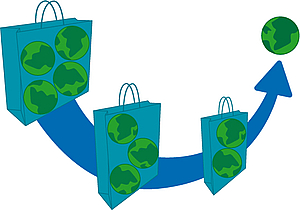
Business Case for Sustainable Consumption
EXPLORING THE BUSINESS CASE FOR SUSTAINABLE CONSUMPTION
Business has a huge role to play in encouraging sustainable ways of living. As consumers become more and more aware of the environmental impacts of consumption, sustainable business strategies will increasingly offer new opportunities to the companies that serve this growing market. It is the time for companies to act, communicate and enable consumers to make sustainable choices. The new business opportunities lie beyond improving the efficiency of production processes. Entire business strategies can be changed to meet environmental and social challenges. Companies are encouraged to assume responsibility for enabling low-carbon consumption patterns.
Business strategies for low carbon and resource efficient lifestyles
The Business Case for Sustainable Consumption project demonstrates six key strategy areas for business to enable sustainable consumption. These strategies are explained in a series of booklets. The first strategy is relatively easy to implement and requires short time frames. To start with, companies can create and satisfy demand for green and fairly produced products by improving life-cycle performance of existing goods and services. The second strategy is to communicate with consumers to encourage reductions in the impacts arising from product use. By offering products with improved use phase performance and raising consumer awareness on the optimal use of products, companies can help decrease negative impacts in a manner that offers consumers an opportunity to play a direct role in minimising environmental impacts. Innovative after sales service is the core aspect of the third business strategy and offers benefits to companies by extending ownership beyond the point of sale.
The necessity for new business models
Encouraging product and service innovation is a strategy area that calls for a radical change by encouraging the creation of new sustainable products and service designs. The final strategies target system level innovation. By switching to service-oriented business models and becoming a leader for social change and socially responsible business, companies can make a meaningful contribution to the transformation toward sustainable consumption patterns. In concrete terms this means bundling the achievements made possible through a successful execution of the other strategies with systemic changes achieved by shifting from product to a service based business models. By doing so longer lasting products are not sold to customers in the traditional manner, but rather provided in a rental, lease or shared ownership model that provides benefits to customers, companies and the environment alike. In order to achieve systemic change of this nature, new dialogues and stakeholder partnerships are necessary.
Outcomes of the project
All project booklets can be downloaded free of charge online http://www.encourage-sustainable-lifestyles.net/booklets.html. The booklets provide guidance for specific industry sectors, public policies, and partnerships for sustainable consumption and sustainable consumption opportunities in developing countries are explored.
Background
This project received financial support from the Marrakech Task Force on Sustainable Lifestyles that was led by the Swedish Ministry of the Environment between 2005 and 2009.
For details and additional information visit the project website: http://www.encourage-sustainable-lifestyles.net/
Downloads
Exploring the business case of sustainable consumption in Asia (PDF 200 KB)
